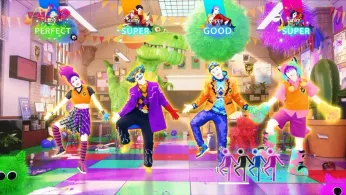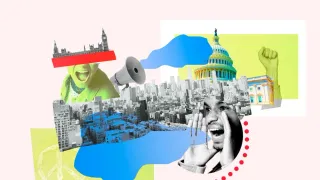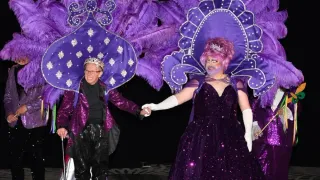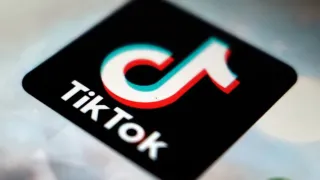
5 hours ago
“Just Dance 2026 Edition” Sets New Standard for Queer Representation in Gaming
READ TIME: 3 MIN.
When “Just Dance 2026 Edition” launched worldwide in October 2025, it wasn’t just another annual installment in Ubisoft’s long-running rhythm franchise—it quickly became a flashpoint for conversations about queer visibility in gaming culture. For the first time in the series’ history, the game features a curated playlist dominated by openly LGBTQ+ musicians, introduces non-binary and gender-fluid avatars, and showcases choreography developed in collaboration with LGBTQ+ dancers and creators. This bold approach has drawn acclaim from advocacy groups and players alike, even as it reignites long-standing debates about the authenticity of mainstream representation and the commercial motivations behind such inclusivity .
Ubisoft’s creative team began development on “Just Dance 2026 Edition” with the explicit goal of “centering queer joy and resilience through music and movement,” according to senior producer Camille Laurent . The game’s roster includes tracks from chart-topping queer artists such as Lil Nas X, Hayley Kiyoko, Todrick Hall, and Sam Smith, as well as emerging non-binary stars in global pop and hip-hop. In a notable first, the avatar customization suite now allows players to choose from a spectrum of gender expressions, including non-binary and agender options, free from the constraints of binary pronouns or traditional body archetypes .
Choreography for several headline tracks was co-created with LGBTQ+ dancers and drag performers, including members of prominent ballroom houses and drag collectives. “We wanted to make sure the moves reflected the true diversity and creativity of queer dance culture, not just sanitized versions for the mainstream,” said choreographer and ballroom icon Dashaun Wesley in an interview . This approach has been recognized by organizations such as GLAAD and Out Magazine, which praised the game for elevating queer voices and aesthetics in a global interactive format .
The LGBTQ+ gaming community’s reaction has been overwhelmingly positive, with many players taking to social media platforms and gaming forums to share their experiences of feeling “seen” for the first time in a mainstream rhythm game. Posts tagged #JustDancePride and #QueerJoy trended on X and TikTok during launch week, with viral videos showcasing players performing routines with their chosen avatars and discussing the personal significance of the game’s expanded representation .
However, the release has not been without criticism. Some advocates and journalists have raised concerns about the potential for “rainbow capitalism”—the practice of commodifying queer identities for profit without meaningful support for LGBTQ+ communities. “Representation matters, but it’s important to interrogate how and why these choices are made. Is it allyship, or is it marketing?” asked game critic Dia Lacina in a widely shared op-ed for Polygon . Ubisoft responded by highlighting its partnership with LGBTQ+ non-profits and pledging a portion of the game’s proceeds to queer youth organizations in key markets .
“Just Dance 2026 Edition” arrives at a time when the gaming industry is under increasing scrutiny for its handling of diversity and inclusion. While indie games have long been at the forefront of authentic queer storytelling, major publishers have faced criticism for lagging behind or offering only surface-level representation . Ubisoft’s latest entry, by contrast, is being hailed as a turning point for AAA titles, demonstrating that inclusive design can be both artistically ambitious and commercially successful.
“This isn’t just a marketing ploy—it’s a signal that the industry is starting to recognize the breadth of its audience and the importance of authentic representation,” said Dr. Kishonna Gray, a leading scholar in games and intersectionality, in an interview with The Guardian . Other developers are reportedly taking note, with rivals like Harmonix and Nintendo hinting at expanded LGBTQ+ content in upcoming releases .
The game’s success is being celebrated as a watershed for queer gamers, who have historically been marginalized or rendered invisible in mainstream gaming spaces . For many, the ability to see themselves reflected in avatars, songs, and choreography is more than just a cosmetic upgrade—it marks a shift toward genuine inclusion and belonging.
Nonetheless, experts and advocates caution that representation is only the first step. “Visibility is powerful, but it must be accompanied by structural change—behind-the-scenes diversity, community engagement, and ongoing support for LGBTQ+ creators and players,” said GLAAD’s director of gaming initiatives, Blair Durkee . Ubisoft has pledged to continue its work with LGBTQ+ talent, both in creative roles and in its leadership pipeline, but the long-term effectiveness of these commitments remains to be seen .
As “Just Dance 2026 Edition” continues to dominate charts and living rooms worldwide, its impact on LGBTQ+ visibility in gaming is undeniable. Whether it ushers in a new era of authentic representation or serves as a high-water mark in an ongoing struggle, the game stands as a testament to the evolving relationship between queer identities and interactive entertainment . For now, players can celebrate a moment where the dance floor—and the industry—feels just a little more inclusive.






